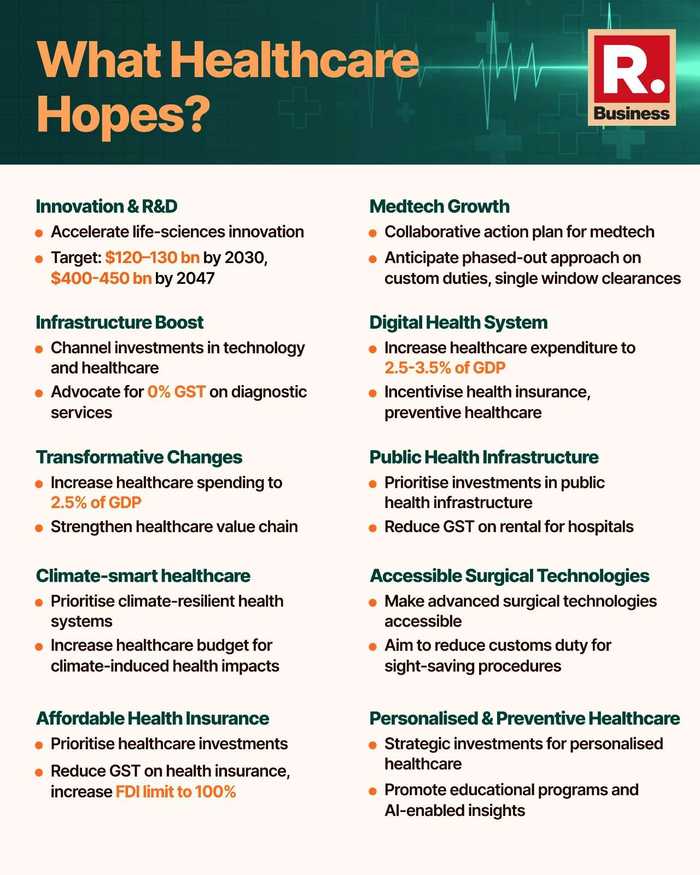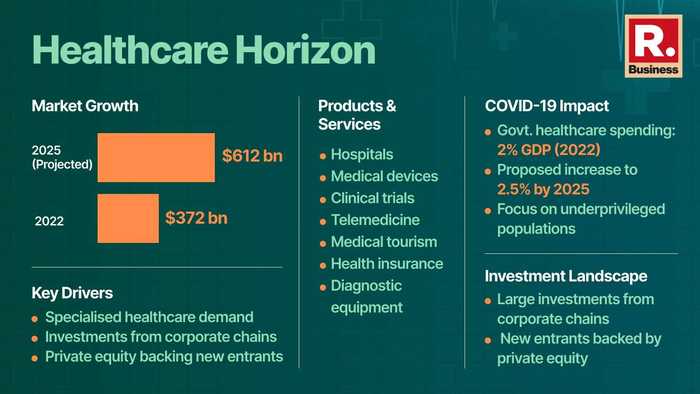Published 17:39 IST, January 19th 2024
Budget 2024: What changes do healthcare heavyweights seek for growth?
Healthcare demands range from innovation to climate-smart approaches, with medtech pushing for collaboration and digital health in focus.
- Republic Business
- 4 min read
Interim Budget 2024: The interim budget 2024 is just a few weeks away, almost every sector has its wishlist from the budget. Just like any other sector, the healthcare industry is abuzz with expectations and demands, with stakeholders outlining their wishlists ranging from a push for pharmaceutical innovation to calls for a climate-smart healthcare approach. The medtech sector is advocating for collaborative leaps, and digital health is taking centre stage.
Dr Vaibhav Kapoor, Co-founder of Pristyn Care, speaking to Republic Business, emphasised the importance of prioritising key healthcare needs in the upcoming budget. According to him, bolstering infrastructure, enhancing accessibility, and fostering innovation should be the government's top priorities.

"Current challenges demand strategic reforms. We seek changes that prioritise sustainability, technology integration, and a patient-centric approach to a resilient healthcare ecosystem," said Kapoor. He also calls for easier access to healthcare financing, reduced GST on health insurance, and a 100 per cent increase in the FDI limit.
Pharma's global leap
Sudarshan Jain, Secretary General of the Indian Pharmaceutical Alliance, set a goal for the pharmaceutical sector in Budget 2024. He calls for an acceleration in innovation and research and development (R&D) to achieve a target of $120–130 billion by 2030 and $400-450 billion by 2047. The industry is transitioning from 'Make in India' to 'Discover and Make in India,' aiming to position India as the global healthcare custodian.
Highlighting the need of the sector, Ameera Shah of Metropolis Healthcare, in conversation with Republic Business, emphasised the need for strategic investments in innovation, technology, and infrastructure. Advocating a focus on Non-Communicable Diseases, Shah suggests measures such as 0 per cent GST on diagnostic services, GST refunds on inputs, and rationalising import tariffs to enhance accessibility and affordability.
Path to Healthcare Wealth
NATHEALTH, in its budget recommendations, urged an increase in healthcare spending to 2.5 per cent of GDP and a rationalisation of the GST framework. Dr Ashutosh Raghuvanshi, MD and CEO of Fortis Healthcare & President of NATHEALTH, highlighted the importance of bridging regional healthcare disparities and strengthening the healthcare value chain for economic growth and job creation.
"We seek to boost medical value travel, address MAT credit issues, and strengthen the healthcare value chain for economic growth and job creation. Focusing on local capabilities in remote regions, healthcare localisation, and professional training are crucial for a resilient and efficient healthcare system in India," he said.

Climate-smart care
Addressing the challenges posed by climate change, Himanshu Sikka, Project Director, Samridh Healthcare emphasised India's focus on climate-smart healthcare. Recognising healthcare's 2 per cent contribution to national carbon emissions, Sikka calls for a heightened healthcare budget for 2024-2025 to combat climate-induced health impacts and ensure long-term sustainability.
Anish Bafna, CEO & MD, of Healthium Medtech, stresses the need for collaborative action plans and conducive policies in the medtech sector. Bafna calls for phased-out custom duties, single window clearances, increased export incentives, and inclusive regulatory frameworks to accelerate access to innovation and support 'AtmaNirbhar Bharat.'
Digital health now: A call to action
Gautam Khanna, CEO of PD Hinduja Hospital and Medical Research Centre, advocates for an inclusive digital health system. Khanna suggests increasing healthcare expenditure from 2.5 per cent to 3.5 per cent of the total GDP, incentivising preventive health check-ups, and providing tax incentives for healthcare skill development. The focus is on supporting digital healthcare initiatives through technology investments.
"Preventive health check-ups are pivotal, averting complications in NCDs and reducing the burden on healthcare facilities. Incentivising health insurance and preventive care is key to tackling the annual 5.8 million deaths from major diseases," he said.
"To fortify healthcare, expedite announced measures, provide tax incentives for skill development, and ensure long-term financing options. Financial support can boost domestic production, catalyse R&D, and incentivise digital healthcare transformation through AI and Machine Learning," he added.

Preventive powerplay
Sigal Atzmon, CEO & Founder, Medix Global, recommended strategic investments in preventive care enabled by personalised screenings and early diagnostics. Atzmon urges the government to prioritise large-scale programs guided by evidence-based best practices and investments in preventive and personalised healthcare services to achieve a significant impact.
"Incentives for personalised preventive check-ups and awareness programs can mitigate the disease burden, addressing gender inequity, reducing cancer, CVD, and diabetes impacts. AI-driven insights and targeted therapies align with the 'Healthy India' vision," he said.
Updated 07:24 IST, February 1st 2024